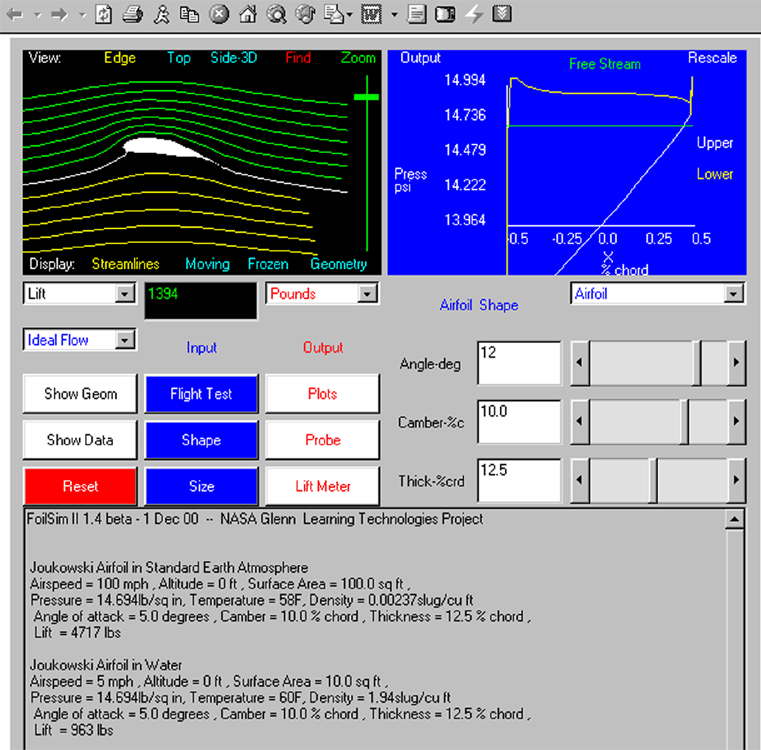 Aerofoil
Simulated Flow Illustration
Aerofoil
Simulated Flow Illustration Aerofoil
Simulated Flow Illustration
Aerofoil
Simulated Flow Illustration
Background: Tunnel boats rely on aerodynamic lift to give them their outstanding performance. Understanding how these aerofoils work, is important to a good tunnel boat design. Outline: The FoilSim software was developed at the NASA Glenn Research Center, and is interactive simulation software that determines the airflow around various shapes of airfoils. The Airfoil View Panel is a simulated view of a wing being tested in a wind tunnel with air moving past it from left to right. Students change the position and shape of the wing by moving slider controls that vary the parameters of airspeed, altitude, angle of attack, thickness and curvature of the airfoil, and size of the wing area. The software displays plots of pressure or airspeed above and below the airfoil surface. A probe monitors air conditions (speed and pressure) at a particular point on or close to the surface of the airfoil. The software calculates the lift of the airfoils, allowing viewers to learn the factors that influence lift. Operation: This software runs on your screen as an applett. You can investigate how a wing produces lift by changing the values of different factors that affect lift. You can change the views of the airfoil to show the edge (viewed looking along the leading edge), or top (viewed from above looking down on planform), or 3D (orthographic projection of the three dimensional wing) |
 Animated!
Also see: |
| You can change the view of the simulated flow field to show moving
particles flowing past the airfoil, or particles drawn as line
"traces", or streamlines (collections of the particle
traces to form a solid flow line). Output Plots show either Surface Pressure (plot of the lower surface pressure and upper surface pressure, and free stream pressure) or Surface Velocity (plot of lower surface and upper surface pressures. You can also change output to show Lift or Lift Coefficient, or select the Probe to explore the flow around the wing (green trail of "smoke" is swept downstream from the probe location).You can vary the aerofoil type (classic airfoil shape, or an ellipse, or a thin plate cross section), vary the shape (camber, thickness, or the angle of attack of the cross section.), or vary the size (chord, span, or wing area). You can illustrate a flow simulation (called a "Flight Test"), or you can change the lift by varying the speed, or by changing the fluid to air or water, or values of temperature and pressure for your fluid. |
(To view the simulation, click here. After clicking button, wait for several seconds while the applette loads in a new window) [requires Java] (Get your own copy of the Aerofoil Simulation program) |
Check out more info on Tunnel
Boat Designs: ![]()
Copyright AeroMarine Research�
Last revised:
April 25, 2024
|
|
||
|
13th edition "Secrets of Tunnel Boat Design" book |
"Secrets
of Propeller Design" book! |
|
|
"TBDP Version 8" Software "VBDP Version 8" Software "PropWorks2" software |
||
|
Order with your Shopping Cart Special pricing updated March 29, 2025 |
Contact
us at: AeroMarine Research® 67 Highland Crescent, Cambridge, ON, Canada, N1S1M1 Tel: 519-240-7959 |
|
|
©Copyright by AeroMarine Research and
Jim Russell, 1999, all rights reserved. Material from this website may be not copied or used or redistributed, in whole or in part, without specific written consent of Jim Russell or AeroMarine Research®. |
||